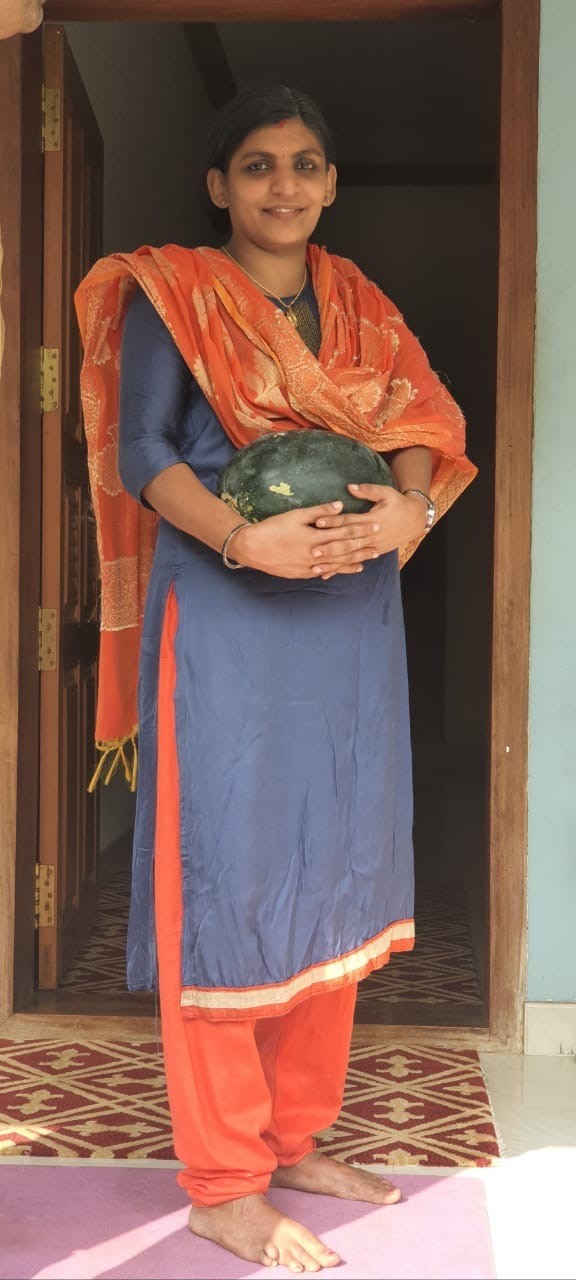Amid the COVID-19 pandemic, many people moved from urban areas to their hometowns in remote villages. While some wanted to work in the midst of nature, others quit their jobs altogether to spend time in their native villages and start businesses of their own.
However, 43-year-old Seema Ratheesh, a mathematics teacher at the Government Higher Secondary School, Kumbla, Kerala has managed to retain her old job and simultaneously take up agriculture. In November 2020, she started cultivating organic watermelons on her 2.5-acre land and harvested 5 tonnes of the fruit until April, when the season ended.
“I moved to Meengoth, Kerala when the lockdown was announced. Since I had to teach virtually, my family and I decided to move in with my mother and brother. I had a lot of free time, and with help from my husband, brother, and a family friend, I began the cultivation of the Sugar Queen variety of watermelons,” Seema tells The Better India.

Taking charge of ancestral land
Seema belongs to a family of farmers. Her father, Madhavan Nair, had farmlands across 15 acres, where he cultivated paddy, areca nut trees, rubber trees, and banana. However, three years ago, he passed away, and Seema’s mother, Vilasini, and brother Manoj Kumar took over the farming business.
“During the lockdown, when we were staying in my mother’s home, my brother explained how income from farming was not like before. He told me that he had to manage his day job with farming simultaneously, and the yield was not as high as it used to be. I decided to step in and change our farming practices so that we could earn more money from the land. So, we consulted our family friend, Nashid, a resident of Mararikulam, who has been an ardent organic farmer for over a decade,” says Seema.
Nashid suggested that for the quality of land found in Meengoth, it would be advisable to grow the Sugar Queen variety of watermelons, which are well-known for their bright red pulp and sweet taste. However, instead of growing it via a traditional method, on Nashid’s advice, Seema decided to use a precision farming method.
“In the first few weeks of November, we spent time cleaning the 2.5 acres of agricultural land. We removed weeds, stones, and added nourishment to the soil,” says Seema, adding that this was done with three others who worked in their fields.
Growing melons organically
Before planting the saplings, the fertile soil was piled up in straight lines. Compost and dry leaves were added over this. Finally, mulching bags were placed over the soil along with water pipes for a drip irrigation system.
“After spending about Rs 5 lakh to prepare the ground, we planted all the seeds on 20 November. The drip irrigation system provides water to the crops three times a day,” says Seema.
She would visit the farm every morning for one hour to check on the crops, then go back home to begin her work for the day. Then, she would visit the farm in the evening, once she was free from household chores.
Within one month, the seedlings grew bigger, and Seema had to provide fertilisers to ensure their healthy growth. However, instead of directly spraying them on the plants, she decided to mix them with the water and allow the mixture to be fed through the drip irrigation system.
“The organic fertiliser is a concoction prepared by Nashid and sold in bottles. One part of this is mixed in a specific ratio of water and then added into the tank with the water for the drip irrigation system. Further, instead of only water, the crops were given organic fertilisers three times a day,” says Seema, adding that this was a reason for a successful harvest.
In January 2021, Seema made her first harvest of watermelons, inaugurated by the former revenue minister E Chandrasekaran. She had up to 3 tonnes of the fruit which were sold to consumers in various districts including Kasargod, Kannur and Thalassery.
The fruits were fresh for up to 15 days and were sold at Rs 25 per kilogram. Seema says that though people complained about the high prices initially, after tasting the fruit, they came back asking her for more. By the end of the season in April, she had sold up to 5 tonnes of the fruit and earned around Rs 2 lakh.
Seema continues to receive orders for the Sugar Queen variety of watermelon even though the season is over. Now, on the same land, she has begun cultivating ladies’ fingers and hopes to add chillies and onions soon.
If you found our stories insightful, informative, or even just enjoyable, we invite you to consider making a voluntary payment to support the work we do at The Better India. Your contribution helps us continue producing quality content that educates, inspires, and drives positive change.
Choose one of the payment options below for your contribution-
By paying for the stories you value, you directly contribute to sustaining our efforts focused on making a difference in the world. Together, let's ensure that impactful stories continue to be told and shared, enriching lives and communities alike.
Thank you for your support. Here are some frequently asked questions you might find helpful to know why you are contributing?

